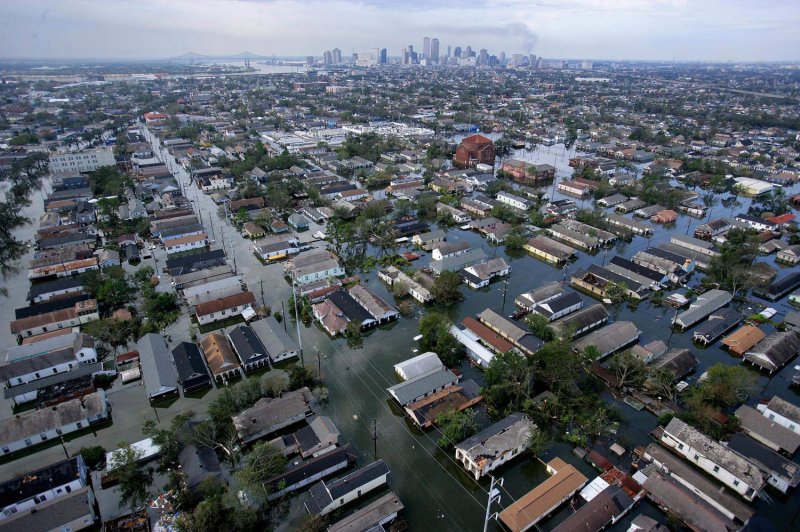An aerial view of the devastation caused by high winds and heavy flooding in the greater New Orleans area following Hurricane Katrina in New Orleans, Louisiana, August 30, 2005. New research suggest climate change is encouraging increasing rates of urban flooding. Photo by UPI Photo/Vincent Laforet/Pool |
License Photo
Aug. 14 (UPI) -- New analysis of flow rates and precipitation totals suggest flooding in urban areas is intensifying while rural areas dry up.
In an effort to identify links between rising global temperatures and river flow patterns, scientists at the University of New South Wales surveyed flow rate and rainfall data from 5,300 river monitoring sites and 43,000 rain gauges in 160 different countries.
Their findings -- published this week in the journal Scientific Reports -- suggest a warmer atmosphere is holding more water, yielding more intense rainstorms.
However, their analysis also revealed an anomaly. The findings showed accelerating rates of intense precipitation are outpacing flooding rates. Researchers found a rural-urban divide explains the discrepancy.
Warmer temperatures are causing soil to evaporate more quickly. This makes rural environments, where soils are plentiful and drying, less prone to flooding. In and around cities, soil is scarcer. Urban settings are less able to absorb large amounts of precipitation, which explains the rise in urban flooding.
"It's a double whammy," lead study author Conrad Wasko, a postdoctoral fellow at UNSW's Water Research Center, said in a news release. "People are increasingly migrating to cities, where flooding is getting worse. At the same time, we need adequate flows in rural areas to sustain the agriculture to supply these burgeoning urban populations."
The findings highlight major challenges presented by global warming. How communities and governments guard against the risks facing urban infrastructure and resources like food and water?
"Climate change keeps delivering us unpleasant surprises," said Mark Hoffman, dean of engineering at UNSW. "Nevertheless, as engineers, our role is to identify the problem and develop solutions. Knowing the problem is often half the battle, and this study has definitely identified a major one."
Unlike many climate science studies, the latest findings are based on real-world data and analysis, not the predictions of climate models.















